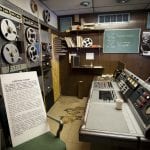Elvis Presley – Elvis 75: Good Rockin’ Tonight
Elvis Presley – Elvis 75: Good Rockin’ Tonight (RCA Legacy)
Elvis was not only the king of Rock ‘n’ Roll (Little Richard’s claim on the crown notwithstanding), but in his afterlife he has also become the undisputed king of reissues and anthologies. RCA’s four-CD set, spanning from his earliest self-funded acetates through late home recordings and live sides, his last major studio works and a post-mortem remix, offers no new tracks for Presley’s legions of collectors, but provides a superb introduction and deep overview for anyone who’s heard about, rather than heard, the King. Those who know a few hits or have sat through an Elvis movie or two will find the greatness of his musical catalog measures up to the hype and explains the dedication of his most ardent fans.
Collected here are on hundred tracks, beginning with Presley’s very first recording, “My Happiness,” waxed on his own dime as a gift for his mother. His earliest commercial sides show how he forged hillbilly, blues and country roots into his personal strand of rock ‘n’ roll, first for Sun with Scotty Moore and Bill Black, and then, with the addition of D.J. Fontana on drums and A-list guests like Floyd Cramer and Chet Atkins, for RCA. These early works aren’t so much primitive as they are elemental – the lack of production pomp or circumstance presents Elvis as an unadorned and raw rock ‘n’ roll spirit. The addition of a backing vocal trio, as can first be heard on 1956’s “I Was the One,” showed a crooning side of Elvis that would continue to reappear even as he continued to explore rockabilly and blues.
From the 50s through the 70s Elvis moved through a variety of producer’s hands and a number of different studios, and got something different from each. His studio recordings took him from Memphis to Nashville, north to New York, west to Hollywood, back to Nashville where he worked in RCA’s legendary Studio B and back to Memphis for his legendary late-60s sessions at Chip Moman’s American Studios. By the early ‘70s, on the heels of his televised comeback special, Elvis once again became a live draw, and selected sides find him in Las Vegas, Honolulu and on the road in Ann Arbor, Michigan. Elvis waxed his share of clunkers, but with each new direction and in each new setting he seemed to record something worthwhile, and producer Ernst Mikael Jorgensen has done a masterful job of picking highlights.
More importantly, Jorgensen has intermixed iconic hits with lesser known singles and album tracks, showing the depth of Elvis’ artistry and the catalog he created. Elvis often overwhelmed the charts with hit singles, leaving terrific performances such as the energized “One-Sided Love Affair,” a bluesy cover of Lloyd Price’s “Lawdy Miss Clawdy” and the gospel “Thrill of Your Love” to languish as album tracks. Even more surprising is a 1962 version of “Suspicion” that pre-dates Terry Stafford’s hit by two years. Elvis’ soundtracks included their share of dregs, particularly as the ‘60s wore on, but they also included hits and great album tracks like a scorching version of “Trouble” from King Creole and bluesy covers of Dylan’s “Tomorrow is a Long Time” from Spinout and Jimmy Reed’s “Big Boss Man” from Clambake.
While other artists reinvented themselves to fit the times, Elvis bent the times around himself (excepting “Yoga is as Yoga Does,” thankfully not included here), staying true to his voice as everything around him changed. His producers, songwriters, and musicians kept turning over, but in the center of it all Elvis sang a surprisingly straight line from ’53 to ‘77. Even as his voice matured and the productions were influenced by his Vegas stage show, the fire in his delivery remained. Whether singing rock, blues, country, soul, pop or gospel, his performances found a true line stretched from the Sun sessions through RCA studios in Nashville, New York and Hollywood, a stint in the army, a catalog of often mediocre films, his 1968 resurrection, a triumphant return to Memphis, and country sessions that brought him back to his roots.
For many listeners, disc four will be the least familiar. Covering 1970 through 1977, these selections find Elvis’ singles charting lower, but still delivering the goods. Only “Burning Love” made the top-5, and his other top-10 from that stretch, “The Wonder of You,” is not included. “An American Trilogy,” is at once bombastic and utterly show-stopping, his version of “Always on My Mind” made the country charts but should have found cross-over success before Willie Nelson ten years later, and his last single, “Way Down,” though given to ‘70s production sounds, finds his gospel fervor undimmed. The beat heavy remix of “A Little Less Conversation” that closes the set shows just how easily Elvis’ voice could slide into new contexts (the original film performance from Live a Little, Love a Little is worth searching out on DVD, by the way). These hundred tracks aren’t a complete run through every Elvis highlight, but they tell the entire arc of his musical career in a compelling and thorough way.
The box includes an 80-page booklet that features a biographical essay by Billy Altman, numerous photos, reproductions of original record labels, covers and picture sleeves, movie posters, master tape boxes, and detailed recording, chart and personnel data. RCA/Legacy is releasing a companion 26-track single disc that cherry-picks this box, and though it may prove useful as a guide to further Elvis purchases, it doesn’t provide the compelling, detailed portrait of this four-disc set. With more Elvis 75th-birthday anniversary reissues on the way (and a terrific 2-CD version of From Elvis in Memphis already out) you may be tempted to put together your own collection, but you’d have a hard time assembling a more compelling introduction than this box.




